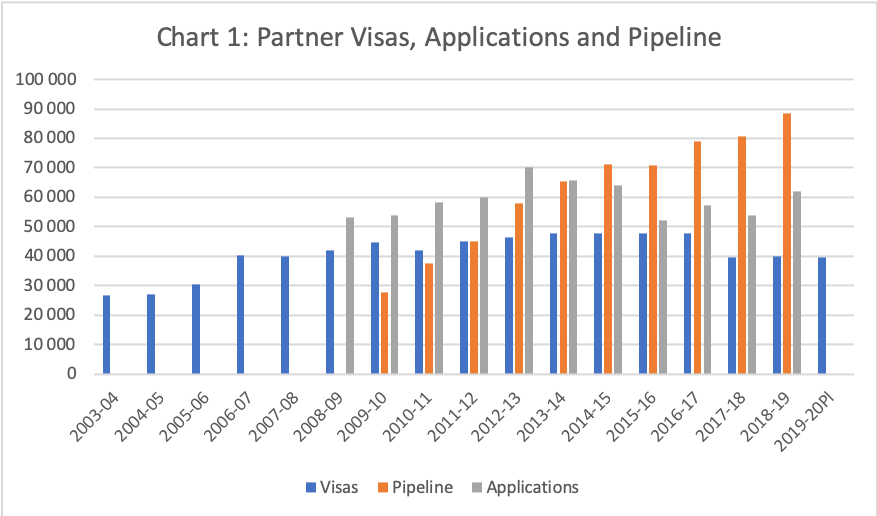ABUL RIZVI. Highlights of 2018-19 Migration Program Outcome
December 8, 2019
Minister Coleman has at last allowed the 2018-19 Migration Program report to be published in early December. These are usually finalised each July. Two highlights: (1) the Partner visa application pipeline has reached almost 90,000 and is certain to grow much further in 2019-20; and (2) the backlog of employer sponsored visa applications is falling fast and will require Coleman to back-track on the ham-fisted changes to these visas made by Peter Dutton.
The 2018-19 Program was delivered at 160,323 places, down from 162,417 in 2017-18. The outcome included 6,209 formal permanent residence visas to NZ citizens these visas have traditionally not been counted as part of the migration program. This distorts historical comparisons and makes the skill stream appear larger than it actually is.
84,260 visas were delivered to people already in Australia and hence would mostly have already been counted as part of net overseas migration.
The direct contribution of the permanent migration program to net overseas migration continues to decline, especially after adjusting for permanent residents who leave Australia on a long-term or permanent basis (over 21,000 in 2017-18). With a weaker Australian economy and labour market and the longer four year wait for access to social support bites, permanent departures will grow.
Partner Migration
39,918 partner visas (ie partners of Australian citizens or permanent residents) were issued in 2018-19 around the same level as in 2017-18 but around 8,000 less than in 2016-17. With an increase in applications from 57,144 in 2017-18 to 61,884 in 2018-19, the pipeline of partner visa applications continued to grow to almost 90,000. With less than 40,000 places available in 2019-20, this pipeline will continue to grow (see Chart 1).

Government seems to think it is good policy to keep 10,000s of Australian citizens apart from their partners or to force them to live elsewhere while allowing scamsters to facilitate the entry of 10,000s of non-genuine asylum seekers.
Note this is not a question of immigration integrity as the refusal rate for partner visas has remained around 10 percent for many years and the set aside rate for partner applications at the AAT has increased to 59 percent in other words the quality of Home Affairs decision-making has been deteriorating. This is after Australian citizens and their partners have paid an application charge of almost $8,000 at the primary stage and often have waited for two years or more.
With the lack of places for partners in the migration program in 2019-20, that wait will rise. Introduction of a premium service channel under a privatised visa system would mean the application charge would increase further and the waiting time would rise further for those unable to pay the higher charge for the premium service channel.
This is indeed scandalous (see here and here).
Employer Sponsored Migration
By contrast, the pipeline for permanent employer sponsored visas has fallen from 54,673 at end June 2018 to 29,513 at end June 2019. The application rate has fallen from 71,327 in 2016-17, 51,969 in 2017-18 and 32,385 in 2018-19.
This decline is the result of ham fisted changes announced by Peter Dutton in early 2017 and largely implemented from early 2018 (see here).
With a refusal rate of around 16 percent, the Government will struggle to deliver to its planning level of 40,000 permanent employer sponsored visas in 2019-20. Delivering the same planning level in 2020-21 for permanent employer sponsored migration would be impossible without significant unwinding of Duttons changes.
AbulRizvi was a senior official in the Department of Immigration from the early 1990s to 2007 when he left as Deputy Secretary. He was awarded the Public Service Medal and the Centenary Medal for services to development and implementation of immigration policy, including in particular the reshaping of Australias intake to focus on skilled migration. He is currently doing a PhD on Australias immigration policies.
